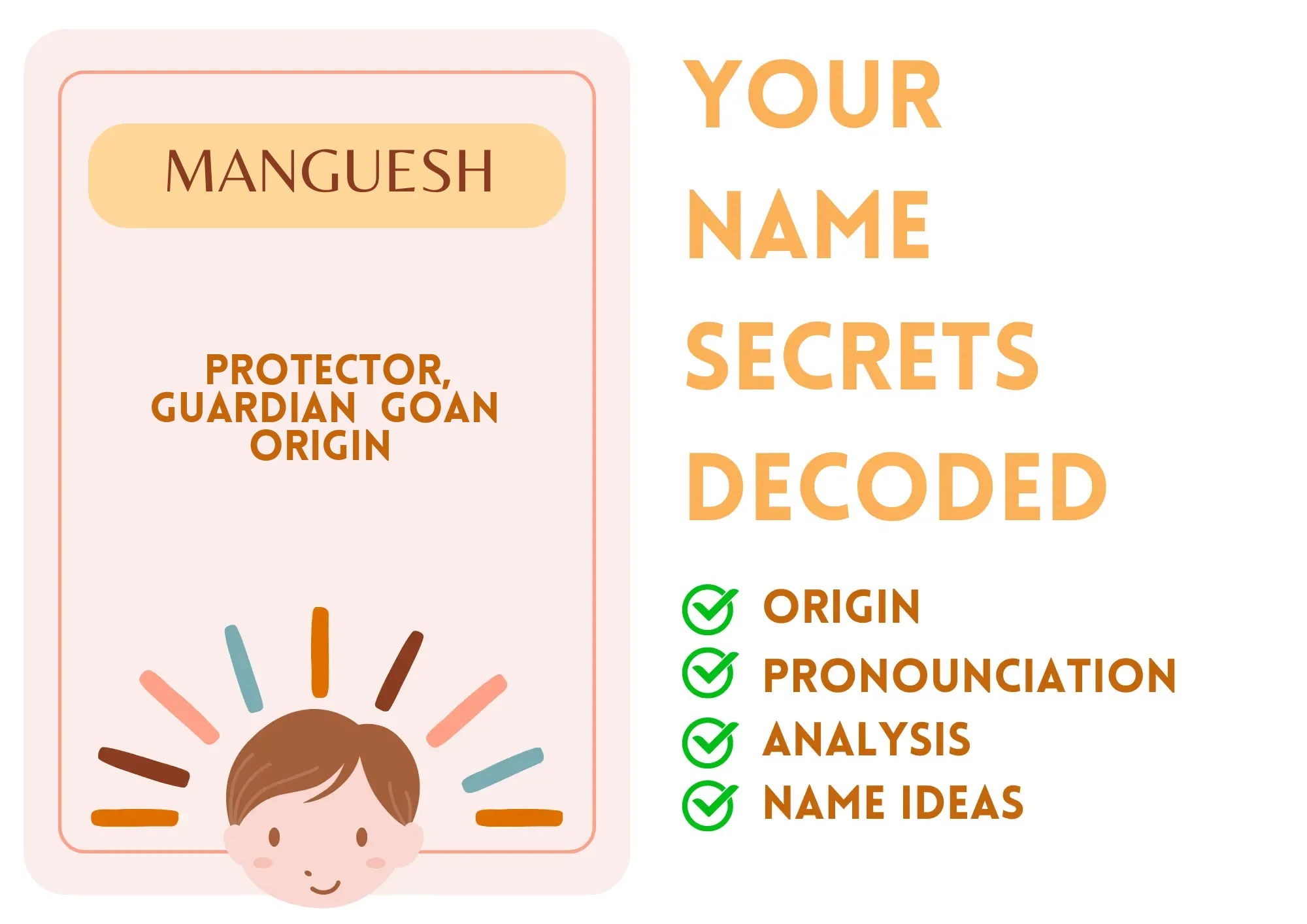
Manguesh
Manguesh is a culturally rich name with roots in the Indian state of Goa, derived from the term ‘Mangu,’ a historical term referring to a guardian or protector. It is primarily a masculine name, often associated with the worship of Lord Shiva in the form of the Mangesh temple, which is a significant place of pilgrimage in Goa. The name embodies a sense of protection, divine presence, and cultural heritage, resonating with the local population and those sharing ancestral ties.
This name is considered auspicious among families in Goa, and it evokes feelings of strength, spirituality, and cultural pride. It is relatively easy to pronounce and write, making it accessible for most. Common nicknames include ‘Mango’ and ‘Gush’.
Manguesh also holds a place in popular culture, particularly within the Goan community, where it is often celebrated in local folklore, stories, and songs. It carries positive connotations, associated with stability and cultural identity.
Basic Information
Gender: Boy
Sounds Like: mun-GAYSH
Pronunciation Explanation: The first syllable is pronounced 'mun', similar to 'man' with a softer 'n'. The second syllable 'GAYSH' has a long 'ay' sound, rhyming with 'grace'.
Summary and Meaning
Meaning: Protector, guardian (Goan origin)
Origin: The name Manguesh has its origins in Goa, India, with strong connections to local Hindu traditions and the worship of deities.
Usage: Manguesh is traditionally a masculine name, strongly associated with male figures in Goa, particularly in the context of divine guardianship.
Name Number (Chaldean)
Name Number (Pythagorean)
Name Constellation (Nakshatra)
Name Zodiac Sign (Rashi)
Popularity (Global Rank)
Overall: 183029
Boys: 72681
Most Popular in
Religious and Cultural Significance
Religion: Hindu
Background: In Hindu culture, particularly in Goa, Manguesh is associated with Lord Shiva, revered in the Mangesh temple, significant for devotees who perceive it as embodying divine qualities.
Cultural Significance: Manguesh is culturally significant among the Goan people, known for its representation of strength and guardianship, often selected by families honoring their ancestral and religious traditions.
Historical Significance: Historically, Manguesh represents not just a name but also a cultural identity linked to the Mangesh temple, a site of pilgrimage that dates back centuries, symbolizing the protective aspects of divinity within the community.
Popular Culture
Literature and Mythology: Manguesh features in many local tales and folklore, often depicted as a guardian figure or protector in stories passed down through generations.
Movies and Television: In popular culture, characters named Manguesh may appear in regional films, typically embodying themes of heritage, faith, and strength.
Feelings and Perceptions
Perception: Manguesh is perceived positively, reflecting strength, culture, and spiritual significance. It resonates well with the community, often evoking a sense of pride.
Positive Feelings: Strong, spiritual, protective, culturally rich, auspicious.
Negative Feelings: Might be challenging for outsiders unfamiliar with Goan names; pronunciation could be misinterpreted.
Practical Considerations
Ease of Writing and Calling: Manguesh is moderately easy to write and pronounce, with seven letters and two syllables making it somewhat memorable, especially within the Goan community.
Common Typos and Misspellings: Mangesh,Mangesh,Monguesh,Mangushe
Common Nicknames: Mango,Gush,Mangu
Manguesh Popularity
Manguesh Usage and Popularity By Country
| Country | Rank (Overall) |
|---|---|
| Bahrain | 5914 |
| India | 38021 |
| United Kingdom | 118019 |
Manguesh Usage and Popularity By City
| City | Rank (Overall) |
|---|---|
| North Goa | 587 |
| South Goa | 1364 |
| Mormugao | 417 |
| HyderÄbÄd | 30123 |
Compatibility Analysis
Famous Persons Named Manguesh
No results found for Manguesh.
Related Names
Similar Sounding Names:
Mangesh,Mikesh,Manikesh,Mahesh